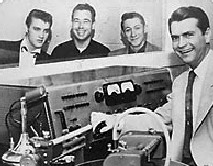

"It
Was Fifty Years Ago Today"
|
 |
5 July 2004 "It was twenty years ago today," sang The Beatles about Sergeant Pepper, who, we then learn, taught the band to play. Well, fifty years ago today, Elvis Presley taught a lot more than just the band to play -- he did nothing less than teach the whole world to play. We don't seem to be especially keen on heroes, especially those that do not fit the predefined hero-mould and Elvis certainly did not do that in the clean-cut, very white USA of the 1950s. |
Some commentators, some publicity, tell us that Elvis invented Rock 'n' Roll when he recorded "That's All Right (Mama)" on 5 July 1954. Don't you believe it! Rock 'n' Roll had a naissance dating back to the mid 1940s at least, with recording by the likes of Louis Jordan and Joe Turner. 1949 saw both Roy Brown and Wynonie Harris recording "Good Rocking Tonight."
Even the label for which Elvis recorded "That's All Right (Mama)" has a strong earlier claim to the title of first Rock 'n' Roll Record, with Jackie Brenston's "Rocket 88" (written by Ike Turner), which was one of the biggest selling R&B records of 1951 and spawned an early white copy by Bill Haley and his Comets that same year, as well as a copy of the piano intro by Little Richard on his classic "Lucille."
Haley was of a very different ilk to Elvis. His versions of what were then known as Rhythm and Blues numbers were washed-out attempts, with lyrics suitably sanitised for sensitive white ears; his on-stage appearance was neither as sexy, nor as charismatic or just plain in-your-face as Elvis's. Haley was carefully performing for whites, in other words, telling a reporter, "We stay clear of anything suggestive," when speaking about his version of Joe Turner's "Shake Rattle and Roll," in which the lines," Well, you wear low dresses, the sun comes shining through; I can't believe my eyes, all that mess belongs to you," to "Wearin' those dresses, your hair done up so tight; You look so warm, but your heart is cold as ice."
There were other changes, too, but Haley failed to recognise the significance of "one-eyed cat" and "sea-food store," so these references to male and female genitalia remained! From the sound of Elvis's live versions of the same number, he knew exactly what he was singing about. No, Haley was not a true rocker (and that hurts for an ex-want-to-be Teddy Boy to say!), but a white copy-cat with luck on his side.
Elvis also had luck on his side -- he was white. That's just about the only luck he needed, however, for a rocker he was, even if he didn't realise it himself -- he would have preferred singing Dean Martin-style ballads and gospel music. Elvis had had the unusual privilege of being able to soak up influences from all sorts of popular music, including country, gospel, blues and everything else that was available in Memphis and, prior to that, Tupelo.
Then one day, all of these influences came together and outed themselves through the medium of Elvis, struggling to please Sam Phillips in a Sun Studio try-out, as "That's All Right (Mama)." Was Elvis aware of what he was doing? I think not -- this really was a case of spontaneous combustion, an unconscious amalgam of sounds and styles; a natural eruption. But, as indicated above, we don't like our heroes. Within a short time, Elvis was accused of stealing the music of the Black man, of making racial remarks, and, of course, of being a threat to the goodness of the whites.
All stuff and nonsense, but blown up out of all proportion at the time and, very sadly in the case of the first couple of accusations, still widely believed. May a white man not play black music? Is music the property of any racial group? If so, then must we prevent artists such as Dame Kiri Te Kanawa or Jessye Norman from singing opera? And what about Charlie Pride singing down-home country?
It was not Elvis's fault that the prevailing society at the time was more prepared, however reluctantly, to accept a white performer singing Rhythm and Blues than a black one -- he was as much a victim of the times as the black artists. He went out of his way to stress that black artists had been doing what he was doing for a long time and the debt that his own music owed to the black pioneers.
The charge that Elvis made racial remarks seems to have started in 1957. According to the rumour, he said "The only thing Negroes can do for me is buy my records and shine my shoes," in Boston -- he had never been to Boston at the time, however. "Jet" magazine decided to go in search of the truth and send reporter Louie Robinson the task of finding it. Robinson visited Elvis on the set of "Jailhouse Rock," where Elvis denied ever having made such a statement.
Furthermore, Robinson found, all those that Robinson interviewed (both black and white) and who knew Elvis told him the same thing. "To Elvis," Robinson concluded in his August 1957 article, "people are people, regardless of race, color or creed." And I hasten to add that, in my opinion, to Elvis, music was music regardless of any artificial boundaries any race, colour or creed cared to try to impose on it. Elvis's recording of "That's All Right (Mama)" has proved to be much more than just a step in making Rock 'n' Roll music popular; it made popular culture important, it freed fashion, it changed society. And it was fifty years ago today.